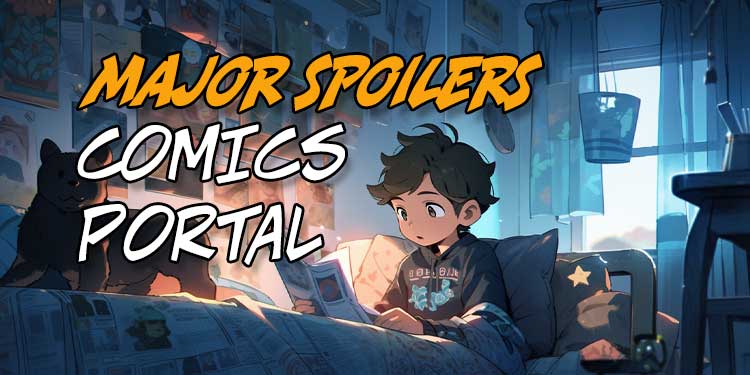Social media continues to be a source of fascinating information about the comics industry. The latest discussion turned the focus to Artificial Intelligence (AI).
‘NOTHING IN THE GUTTER’?
 I’m sure this was bounced off other social media platforms, but on X (the social media platform previously known as Twitter), comics creator Tim Seeley said the following: “AI makes terrible comics, because comics rely on the relationship between the cartoonist and the reader over not only what is shown but what ISN’T. The AI puts nothing in the gutter. It just steals separate images. Collage not comics.”
I’m sure this was bounced off other social media platforms, but on X (the social media platform previously known as Twitter), comics creator Tim Seeley said the following: “AI makes terrible comics, because comics rely on the relationship between the cartoonist and the reader over not only what is shown but what ISN’T. The AI puts nothing in the gutter. It just steals separate images. Collage not comics.”
He continued: “AI is easy and thoughtless. I do think there’s a place for AI in comics, but as an idea generation aid, not as a storyteller… It should be a tool an artist opts into using to express their own ideas.”
He concluded that “(AI) can’t do comics. It can do images.”
I always appreciate Mr. Seeley’s perspective on comics creation, and I am the first to admit that I’m still trying to sort out just how AI should be used. What I THINK he’s saying is that human creators put more in the gutter of a page than what an AI system can do on the entire page. As Mr. Spock might say, “Fascinating.”
NOW THAT THE WGA STRIKE IS OVER…
 As I understand the results of the negotiations between the writers and the companies, creators wanted to be sure that AI was not going to replace “human” scripters anytime soon. What Seeley seems most uncertain about is what would happen if the AI “revolution” replaced the writers with the computer. It’s going to take more time to sort out just what AI is good for (maybe absolutely nothing?), but he seems to think that sequential storytelling via AI is simply not worth the time companies and creators might invest in making happen.
As I understand the results of the negotiations between the writers and the companies, creators wanted to be sure that AI was not going to replace “human” scripters anytime soon. What Seeley seems most uncertain about is what would happen if the AI “revolution” replaced the writers with the computer. It’s going to take more time to sort out just what AI is good for (maybe absolutely nothing?), but he seems to think that sequential storytelling via AI is simply not worth the time companies and creators might invest in making happen.
My own personal use of AI is still evolving, but I am concerned about certain functions I particularly enjoy being absorbed into the computer. I like to write descriptions of my podcast interviews and such, and I also enjoy editing and posting my podcast. I’ve mentioned in a previous column that I’ve been listening to an AI version of my all-time favorite pop singer—Karen Carpenter—and I just don’t find the computer’s take on songs she never sang all that interesting. There is one exception to this rule, though—a holiday song called “Together at Christmas Again” that was written by Karen’s brother Richard after she passed. That song works for me. Eventually, I bet more songs will sound more natural instead of a computer jumping from one note to another without any creative process in between.
This all ties into what Mr. Seeley was discussing about gutters and such. While it is novel to hear something sounding like Karen’s voice laying down tracks that she never sang while singing on this planet, it all feels mechanical instead of inspirational.
Will AI eventually get better at all this? I expect so, but it will take a while, I believe. I do hear stories of AI’s that can “write” a script using information from previously gathered story bits, but what I’ve read doesn’t make it all work on a profound level that comics fans and creators alike have come to expect.
It just “ain’t got that swing,” to quote a famous songwriter.
WHAT IF SOMEONE DOESN’T UNDERSTAND WHAT GOOD WRITING IS?
 This is what creators are most concerned about, seems to me. If a computer can spit out a comics script, so what? However, is it good enough for fans to like? Right now that answer is no, not really.
This is what creators are most concerned about, seems to me. If a computer can spit out a comics script, so what? However, is it good enough for fans to like? Right now that answer is no, not really.
That doesn’t mean that everyone will be able to tell just what AI has been up to and what it hasn’t. My hope is that Mr. Seeley and other accomplished writers will still be able to make scripts that are obviously well-written instead of simply “written.”
It would be a good idea for all of us to be sure we understand just what a piece of good writing actually is. My expectation is that it is something AI may not be able to duplicate, if ever.
The more we know, the better off we’ll be, seems to me. Some of us still work as editors, for instance, and knowing how to tell the difference between computer-generated storytelling and human-generated storytelling will be important as we move forward.
SCIENCE FICTION HAS WORRIED ABOUT THIS FOR DECADES
 Again, Star Trek has fretted over the notion that computers would eventually take over humanity and mess things up pretty seriously, as well as other science fiction.
Again, Star Trek has fretted over the notion that computers would eventually take over humanity and mess things up pretty seriously, as well as other science fiction.
I hope that the now-concluded strike will make things more obvious and keep the line between AI and humanity as far apart as possible. We’ll see.
I think many of us worry that it’s so easy to let the computers do things that we’ll eventually all be like the humans in the animated film, Wall-E. They all floated around in hoverchairs, grossly obese and not having a decent thought in their heads for years.
So, Mr. Seeley, I appreciate your work while making me and others actually think about this whole business! Computers and AI and such can be useful, but good at what they do? Possibly, but not yet! I do worry, though, that AI could dribble out a comics script based on the ones generated previously, and many of us just wouldn’t be able to tell the difference!
We need to keep our noggins functioning properly and continue to move forward!
What do you think? Does AI make a comics script you wouldn’t be able to tell was computer-generated? Does it matter to you if you can’t? What will happen in the years ahead? Whatever your opinions, be sure to share them in the space below!
Dear Spoilerite,
At Major Spoilers, we strive to create original content that you find interesting and entertaining. Producing, writing, recording, editing, and researching requires significant resources. We pay writers, podcast hosts, and other staff members who work tirelessly to provide you with insights into the comic book, gaming, and pop culture industries. Help us keep MajorSpoilers.com strong. Become a Patron (and our superhero) today.


